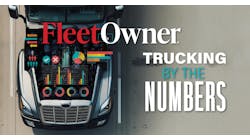Truckload carriers move 70% of freight based on all revenue in the U.S. And the Truckload Carriers Association (TCA) doesn’t take advocating on behalf of this segment lightly.
Over the years, TCA has ramped up its lobbying efforts on Capitol Hill, educational offerings, fleet and driver awards, and overall outreach initiatives. TCA President John Lyboldt, who will retire in April 2022, joined the association in December 2015 and has been on a mission since then to grow TCA. That has meant working to be the voice of truckload carriers.
“I relied on the membership to tell us what they needed, and it’s been successful,” Lyboldt told FleetOwner. “There were things we were doing to help us achieve certain goals and objectives, but there was a lot of noise. We had to reduce some of the noise and constantly be in touch with the membership to make sure that we were going in the right direction.”
Five-and-a-half years later, Lyboldt noted that TCA has had one of the most successful years to date. To keep that momentum going, TCA brought on industry veteran Susan Fall to help broaden the association’s grassroots efforts and awareness.
Education and outreach
Since the start of the pandemic, TCA’s Truckload Academy online educational page has gone through a bit of a revision.
Jim Schoonover, TCA’s VP of education and operations, said during that revision, TCA has become more aggressive when it comes to recruiting content providers to ensure sessions stay relevant.
“We really flipped the model to bring carriers into the picture to have them more actively influence what we provide as content and how we provide it,” Schoonover said. “That’s across the board with all our programs.”
Looking back to the onset of the pandemic, TCA offered nearly 100 educational sessions to members and the public at large. Offerings included topics like personal protective equipment and how to be a better leader and communicator in stressful times. TCA also maintained its core certification programs across human resources, fleet management, and recruitment and retention.
Another area of focus has been webinars. Over the last year and a half, TCA has worked on building its Truckload Live Distance Learning Workshops.
In addition to educational efforts, Highway Angel has been one of TCA’s front-runner programs since its inception in 1997. TCA’s Highway Angel program has recognized professional truck drivers for their good deeds on the job—from simple acts of kindness, such as fixing a flat tire, to lifesaving efforts, such as pulling someone from a burning vehicle and administering CPR.
This year, the Highway Angel program received 75 nominations, which Marli Hall, senior director of outreach and engagement, explained is the highest to date in a 10-year history. In April, TCA launched a new highwayangel.com site, which houses the stories of all the drivers recognized in the program.
“Not only during a pandemic were these individuals essential by delivering goods and services, but they have no hesitation to stop and assist a fellow driver or a fellow motorist,” Hall told FleetOwner.
TCA also offers a Driver of the Year contest for both company drivers and owner-operators, fleet safety awards, safety professional of the year, TCA scholarship fund, and, in collaboration with CarriersEdge, helps put on the Best Fleets to Drive For program.
“I can’t tell you how many times I have been on the interstate and noticed a Best Fleets to Drive For decal on the back of a trailer,” Hall said. “There is a lot of pride for folks to say that they are a top 20 winner. There is definitely a certain caliber with these programs and something we are always striving to improve.”
Government affairs
In 2019, David Heller, TCA’s VP of government affairs, had just shy of 400 congressional visits in a year, and he has a seat on the Federal Motor Carrier Safety Administration’s Motor Carrier Safety Advisory Committee.
“I’ve got the best job in the group. I am the one who gets to go on Capitol Hill and tell the story that is truckload,” Heller said. “I get to tell that story to members of the House, members of the Senate, and staffers, and I help shape the conversations around things like infrastructure and what is good, what’s bad, what should be in it, what shouldn’t be in it.”
Heller added that he feels the industry as a whole has always done a great job telling its story in-house. The key is to spread that message to people outside of the industry. And that’s something Heller and TCA have been working toward.
More recently, Heller noted that elected officials have been calling TCA for information and to see where the association stands on specific industry issues and regulations.
“We have more contacts today at the House and Senate and on FMCSA than we have ever had in the past, and it’s just a tremendous opportunity for people to recognize the value of what TCA brings,” Heller explained.




